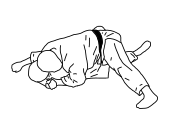Kata gatame
Kata-Gatame (肩固) is one of the seven mat holds, Osaekomi-waza, of Kodokan Judo.[1] It is also one of the 25 techniques of Danzan Ryu's constriction arts, Shimete, list. In grappling terms, it is categorized as a side control hold. Primarily used as a hold down in Judo, it is mostly used as a choke in Jiu-Jitsu and mixed martial arts (also called arm triangle choke). WWE wrestler Braun Strowman and former Impact Wrestling Superstar, Samuel Shaw use this move as their finishing maneuver.
| Kata gatame | |
|---|---|
 | |
| Classification | Katame-waza |
| Successive techniques | Side choke |
| Counter | Sweep |
| Kodokan | Yes |
| Technique name | |
| Rōmaji | Kata gatame |
| Japanese | 肩固め |
| English | Shoulder hold |
Technique Description
Graphic from http://judoinfo.com/techdrw.htm
Can be thought of as a variation of Kesa gatame, often employed when the Uke (person being pinned) gives the Tori (person pinning) trouble in securing the sleeve of the arm. If the Uke's arm is left unencumbered it can be used in various ways to break the Tori's pin control. The Tori will compensate by using his head and shoulder to press the Uke's arm up against the Uke's own head/neck in an effort to control the Uke's arm movement. The Tori should be up on at least one knee, keeping the knee as close to the Uke's body as possible. The Tori's other leg can be outstretched and used in an effort to provide adequate leverage and forward pressure.
Escapes
- Elbow Drive Kata Gatame Escape
- Kata-Gatame Escape And Reverse
Submissions
- Arm-triangle choke
Variations
See also
References
- Mifune, Kyuzo: The Canon of Judo, Kodansha International Ltd. (Tokyo) 2004, ISBN 4-7700-2979-9, p.
- "Archived copy". Archived from the original on 2006-07-20. Retrieved 2006-06-12.CS1 maint: archived copy as title (link)Kata Gatame